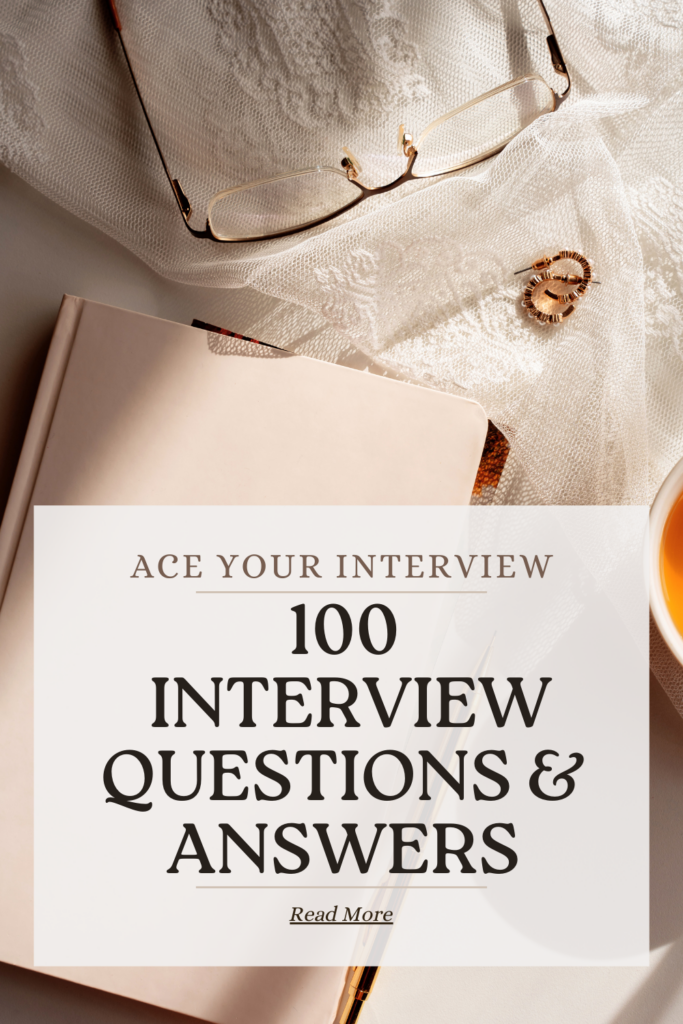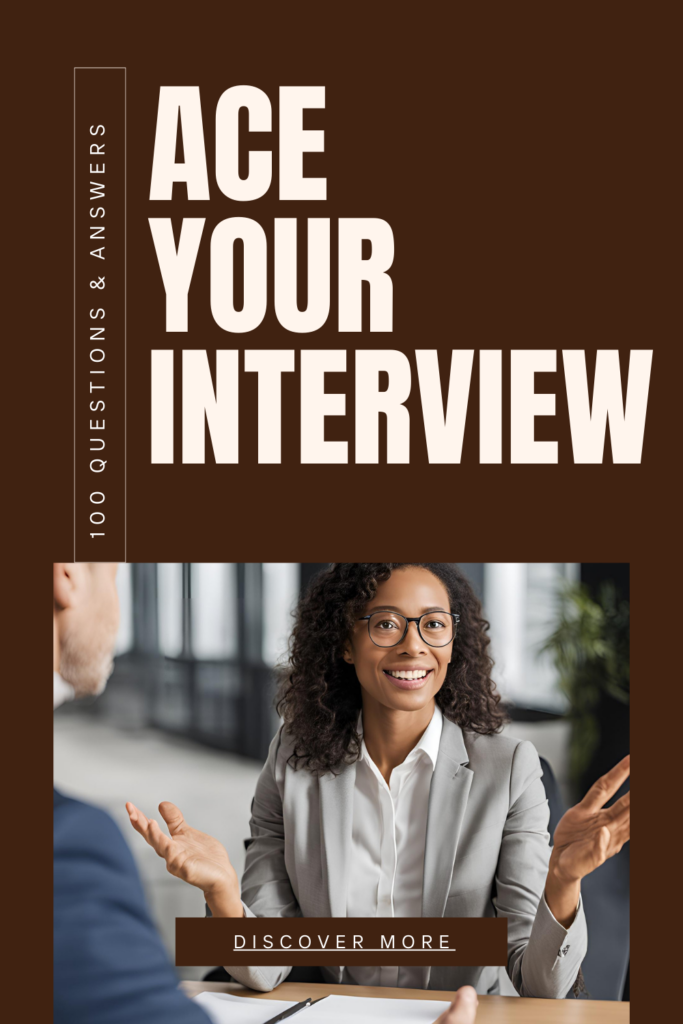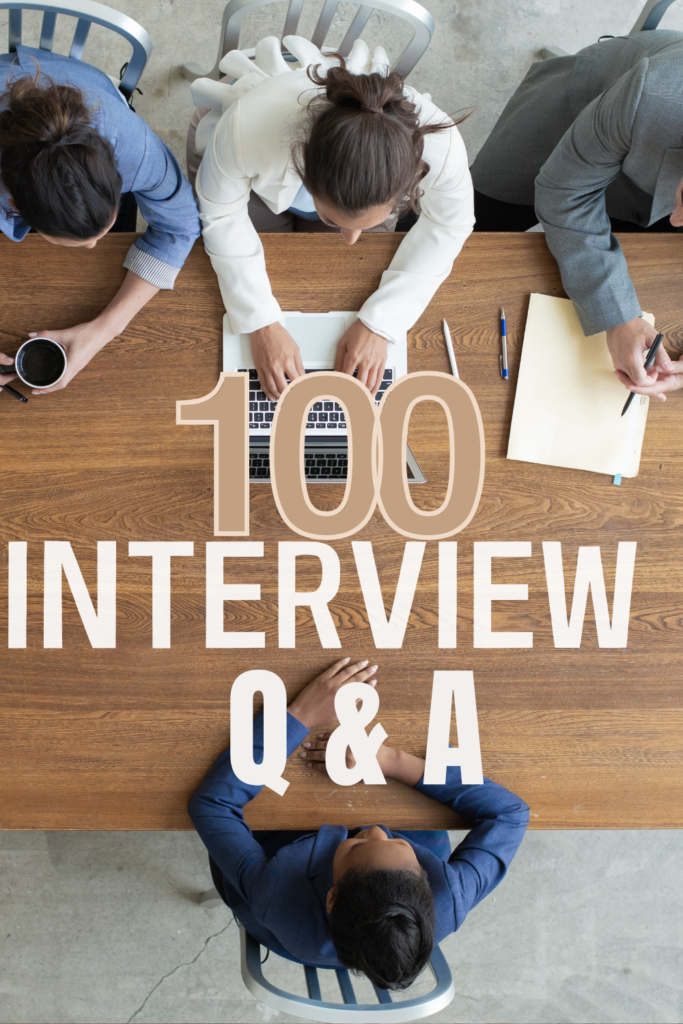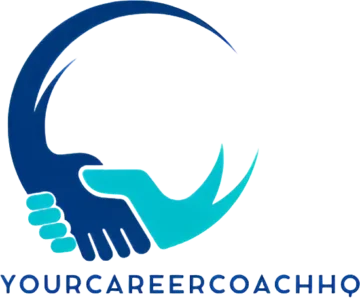Job interviews can be nerve-wracking, but preparation is your secret weapon to success. Knowing how to answer common questions effectively can make all the difference. Below, we’ve outlined 20 commonly asked questions, complete with sample responses and actionable strategies. These are just a preview—download the full guide for all 100 interview questions and answers to fully prepare for your next big opportunity.
Top 20 Common Interview Questions & Answers
1. Tell me about yourself.
Keep it concise, focused, and professional.
Example:
“I’m a marketing professional with over five years of experience in digital marketing. I began as a content creator and transitioned into campaign management, leading projects that increased client engagement by 40%. Outside of work, I enjoy photography and running marathons.”
2. Why do you want this job?
Align your skills with the company’s goals.
Example:
“This role matches my expertise in data analysis and marketing strategy. I’m inspired by your innovative approach and believe I can contribute by leveraging my experience to drive impactful results.”
3. How did you hear about this position?
Demonstrate enthusiasm and proactive research.
Example:
“I found this role on LinkedIn while exploring opportunities aligned with my career goals. Additionally, a former colleague spoke highly of your company, which further motivated me to apply.”
4. Tell me something not on your CV.
Showcase a unique personal achievement.
Example:
“I volunteer as a STEM mentor for underprivileged students, which has taught me patience and effective communication skills.”
5. Why should we hire you?
Focus on your unique value proposition.
Example:
“I bring a combination of experience, proven results, and enthusiasm. For instance, I led a project that reduced costs by 20%, and I’m confident I can deliver a similar impact here.”

6.Why do you want to leave your current job?
Frame your answer positively.
Example:
“While I’ve gained valuable experience, I’m seeking new challenges that align more closely with my career aspirations and allow me to make a greater impact.”
7. Why are there gaps in your employment?
Be honest and highlight personal growth.
Example:
“During this time, I pursued certifications in project management and digital marketing. This allowed me to enhance my skills and return to the workforce stronger.”
8. Where do you see yourself in five years?
Demonstrate ambition and alignment with the company’s goals.
Example:
“In five years, I aim to grow within your organization, take on leadership roles, and contribute to strategic initiatives while mentoring new team members.”

9. Describe yourself in three words.
Choose words that reflect your work ethic and personality.
Example:
“Driven, adaptable, and collaborative.”
10. What didn’t you like about your last job?
Keep it professional and forward-focused.
Example:
“I valued the experience, but I felt the scope of projects was limited. I’m now seeking a role where I can take on more diverse challenges.
11. What are your greatest strengths?
Highlight specific skills and results.
Example:
“Analytical thinking, communication, and adaptability. For example, I identified a market trend that led to a 15% sales increase in my previous role.”
12. What is your biggest weakness?
Be honest but show how you’re improving.
Example:
“I can sometimes focus too much on details, but I’ve learned to set priorities and deadlines to keep the big picture in view.”
13. What are you looking for in your next job?
Show how your goals align with the role.
Example:
“I’m looking for a role that allows me to apply my skills creatively, contribute to impactful projects, and grow professionally.”
14. How would your friends describe you?
Reflect on positive personal traits.
Example:
“My friends would describe me as dependable, resourceful, and supportive. They often rely on me for advice and problem-solving.”
15. How do you handle pressure?
Provide an example of staying calm under stress.
Example:
“I stay organized and focus on actionable steps. For instance, during a tight deadline, I prioritized tasks and ensured clear communication with my team, leading to a successful project completion.”
16. How would you deal with a conflict with a co-worker?
Show your conflict resolution skills.
Example:
“I’d address the issue privately, listen to their perspective, and focus on finding a resolution that works for both of us.”
17. What makes you angry or annoyed?
Stay professional and focus on solutions.
Example:
“I value accountability, so a lack of it can be frustrating. However, I address such situations calmly and work toward constructive solutions.”

18. How would you deal with a difficult customer?
Emphasize empathy and problem-solving.
Example:
“I’d listen actively, empathize with their concerns, and provide practical solutions to resolve the issue professionally.”
19. Tell me about a time you provided excellent customer service.
Share a specific example.
Example:
“A customer was upset about a delayed shipment. I proactively communicated updates, offered a discount, and ensured expedited delivery. The customer appreciated the effort and left positive feedback.”
20. Tell me about a time you worked in a team.
Highlight collaboration and results.
Example:
“During a product launch, I collaborated with marketing and sales teams to create a cohesive strategy. My role involved developing the content calendar, which contributed to exceeding our sales targets by 30%.”
Take Your Interview Prep to the Next Level
These 20 questions are just the start! The full guide includes detailed answers to 100 interview questions, offering insights and techniques to handle even the toughest scenarios.
💡 Download the complete guide now to unlock:
- Expert strategies for all 100 questions.
- Customizable answers tailored to your experience.
- Actionable tips to boost your confidence.
Why Get the Interview Q & A Guide?
- Comprehensive Preparation: Covers every type of interview question.
- Practical Examples: Real-world responses you can adapt.
- Proven Results: Strategies designed to make you stand out.
Click here to download the full guide and get one step closer to landing your dream job.
Additional Resources to Boost Your Interview Success
Preparing for an interview requires a mix of strategy, confidence, and the right resources. Check out these related articles to sharpen your skills and ace your next interview:
- Last-Minute Interview Prep: How to Prepare for a Job Interview in Under 10 Minutes
Get quick tips to make a great impression, even with limited time to prepare. - How to Answer “What Are Your Salary Expectations?” – Best Example Answers
Learn how to confidently discuss salary expectations without leaving money on the table. - How to Introduce Yourself in a Job Interview
Master the art of introducing yourself to make a memorable first impression. - Top 10 Best Interview Tips: How to Prepare for a Job Interview
Discover essential tips to help you feel confident and ready for any interview scenario.
Job Interviews FAQs
1. What are the most common interview questions?
The most common interview questions include:
- “Tell me about yourself.”
- “Why do you want this job?”
- “What are your greatest strengths and weaknesses?”
- “Why should we hire you?”
These questions are designed to assess your experience, motivation, and cultural fit. To prepare, practice concise, clear, and tailored responses that showcase your skills and align with the role.
2. How should I prepare for a job interview?
Preparation involves several steps:
- Research the company: Understand its mission, values, products, and recent achievements.
- Review the job description: Align your skills and experiences with the role’s requirements.
- Practice common interview questions: Prepare clear and structured answers.
- Plan your outfit: Choose professional attire that matches the company’s culture.
- Prepare questions to ask the interviewer: Show genuine interest in the role and organization.
3. How do I answer “Tell me about yourself”?
Start with a brief overview of your professional background, highlight key achievements, and conclude with your career goals and how they align with the role.
Example:
“I’m a marketing professional with five years of experience specializing in digital campaigns. My most recent project increased customer engagement by 30%. I’m excited about this opportunity because it aligns with my passion for innovative marketing strategies.”
4. What should I bring to an interview?
Here’s a checklist of items to bring:
- Multiple copies of your resume.
- A list of references.
- A notebook and pen for notes.
- Questions for the interviewer.
- Any work samples or portfolios, if applicable.
- A positive attitude and confidence.
5. How should I answer “What are your greatest strengths”?
Choose 2–3 strengths relevant to the role and back them up with examples.
Example:
“One of my strengths is analytical thinking. In my previous role, I identified a market trend that increased sales by 15%. I’m also an excellent communicator, which helps me collaborate effectively across teams.”
6. How do I discuss my weaknesses in an interview?
Be honest about a weakness, but focus on how you’re working to improve.
Example:
“I sometimes focus too much on details, but I’ve learned to balance this by prioritizing tasks and setting deadlines to keep the big picture in view.”
7. What’s the best way to handle salary expectation questions?
Do your research on industry standards and the company’s pay range. Provide a range rather than a fixed number.
Example:
“Based on my research and experience, I’m looking for a salary range between $60,000 and $70,000. However, I’m open to discussing this further based on the role and responsibilities.”
8. How should I handle behavioral questions in an interview?
Use the STAR method (Situation, Task, Action, Result) to structure your answers:
Example:
“In my last role (Situation), I was tasked with improving customer satisfaction scores (Task). I implemented a new feedback system and trained staff on active listening (Action), which resulted in a 20% increase in customer satisfaction (Result).”
9. What are good questions to ask the interviewer?
Asking insightful questions shows your interest in the role. Examples include:
- “What does success look like in this role?”
- “Can you describe the team I’d be working with?”
- “What opportunities for growth does the company offer?”
- “What are the next steps in the hiring process?”
10. How do I follow up after an interview?
Send a thank-you email within 24 hours, expressing gratitude and reiterating your interest in the role.
Example:
“Thank you for taking the time to meet with me today. I enjoyed learning more about the team and how my skills align with the role. Please let me know if you need any additional information.”
11. How can I make a good first impression in an interview?
- Arrive on time or early.
- Dress professionally.
- Offer a firm handshake and smile.
- Maintain good eye contact.
- Start with a positive, confident introduction.
12. What should I avoid saying in an interview?
Avoid negative comments about previous employers, discussing salary or benefits too early, or providing overly personal information. Stay focused on how your skills and experience align with the role.
13. How can I handle tough or unexpected questions?
Stay calm and take a moment to think before answering. If you’re unsure, ask for clarification or give a thoughtful response based on what you know. Example:
“That’s an interesting question. Based on my experience, I’d approach it by…”
14. What if I don’t have experience for the role?
Focus on transferable skills, relevant coursework, internships, or volunteer work.
Example:
“While I haven’t worked in this role before, my experience in [related field] has given me skills like [specific skill], which I’m eager to apply here.”
15. How do I explain employment gaps?
Be honest and positive. Mention how you used the time for personal growth or skill development.
Example:
“During my employment gap, I completed a certification in digital marketing and volunteered with a local nonprofit to refine my skills.”
By understanding and preparing for these frequently asked questions, you’ll approach your next interview with confidence and poise. Ready for more? Download our complete guide with answers to 100 interview questions and take your preparation to the next level!
Share and Support
Know someone preparing for an interview? Share this blog to help them succeed. Together, we can make career success achievable for everyone!
Ready to take the next step?
👉 Download the complete guide now
Facebook, YouTube and LinkedIn for career tips. We’re here to help you feel confident in the job market.





3 thoughts on “100 Interview Questions & Answers (2025): Ace Your Job Interview”
This is very valuable information
You’re welcome. Glad you got value from it
Wow, this post is a game-changer! I feel more motivated than ever to achieve my goals
Comments are closed.